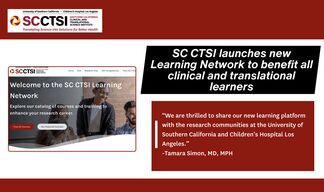SC CTSI Voucher Program Enables Expansion of Study on Infant Motor Development for Children at Risk
The study, directed by USC physical therapy researcher Beth Smith, will delve into the little-understood area of the relationship between caregiver-child interaction and motor skills development.
Earlier this year, the SC CTSI's Clinical Research Support team announced a new voucher program designed to help investigators pilot novel studies or squeeze more experimental value out of existing studies by enabling the generation of additional streams of data. The vouchers provide up to $3,000 to help researchers purchase SC CTSI services or obtain other resources that have the potential to add experimental value to existing research projects.
Beth Smith, PT, DPT, PhD, Assistant Professor in the Division of Biokinesiology and Physical Therapy at Herman Ostrow School of Dentistry of USC, was among the first investigators to use the vouchers, and her experience demonstrated how a small investment in research can pay big dividends for science.
Smith, who directs the Infant Neuromotor Control Laboratory (INCLab), studies the development of neural control of movement during infancy. Motor skill acquisition and development are an important part of many aspects of an infant’s early development. As they develop motor skills, babies gain independence, explore their environment, and expand their understanding of the world. Delays in even very early motor development can have serious ramifications for a growing child.
To develop interventions to improve motor development in infants with developmental delays, or at risk for delays, Smith and the INCLab are preparing a study of movement-training interventions caregivers and parents can use to advance movement skills of such at-risk babies. Specifically, the intervention was designed to increase the quantity of leg movement and the variability of movement experience.
But Smith and her graduate student Marcelo Rosales soon realized they had an opportunity to study an important but little-understood element in caregiver-delivered interventions: the nature of the interaction between caregiver and baby. In short, not all caregivers and parents connect with the kids in their charge in the same manner, and these differences can affect the outcome of interventions.
"We decided we should also evaluate the quality of caregiver-child interaction, but that meant we had we needed to identify and use an experimentally valid assessment of caregiver-child interaction," said Smith. Her team determined that the most valuable assessment scale for this purpose was the widely-accepted NCAST (Nursing Child Assessment Satellite Training).
But to use the NCAST scale, researchers must complete a training course taught by a qualified consultant—an expense that was not covered in the original funding for their infant motor training study. That's when Smith applied for and received an SC CTSI research voucher to cover the costs of the additional training. Because the training course can accept up to 15 people, Smith opened up the additional slots to other interested researchers from USC/CHLA.
Going forward, the NCAST data will help researchers delve further into the understudied area of caregiver-child interaction in physical therapy interventions.
"Through collecting pilot data, we will be able to study the effects of caregiver-infant interaction on our motor skill intervention and develop scientific backing for possible interactions that can contribute to greater motor gains during development," said Smith. "Although it was a relatively small sum of money, by paying for the NCAST training the voucher program will extend the value of our study considerably."



